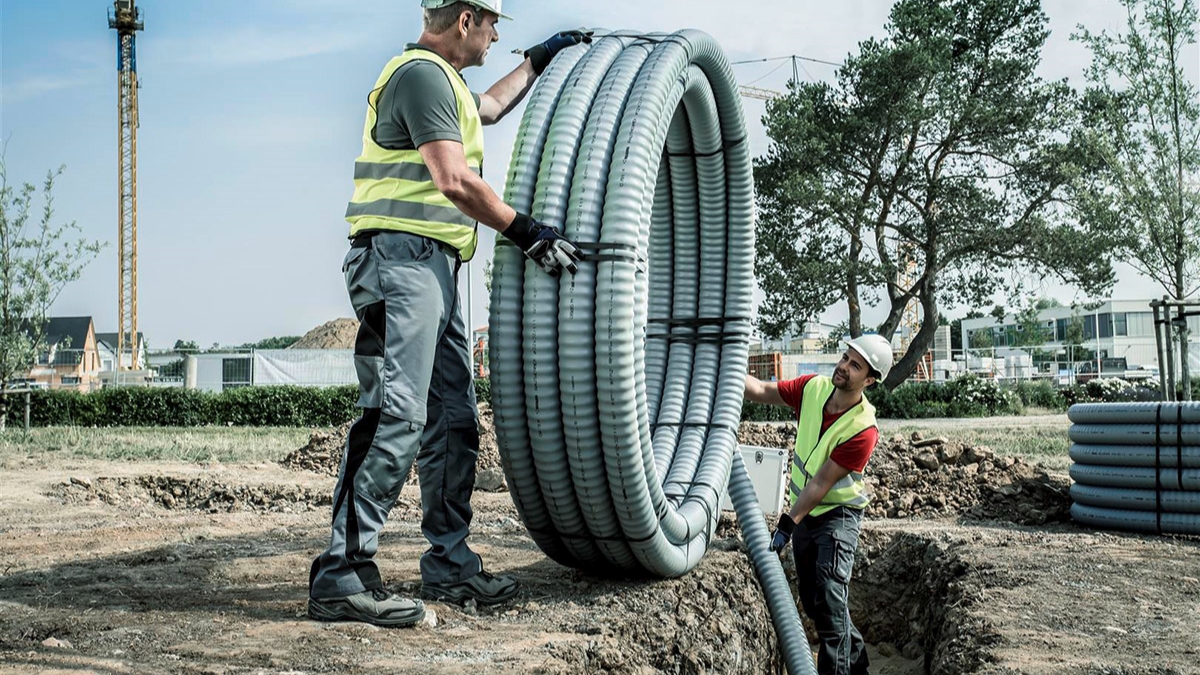With decarbonisation legislation continuing to tighten in the UK, a polymer specialist has carried out a CO2 emissions analysis for contractors looking to measure emissions accrued from transporting sewer pipework to construction sites.
REHAU has highlighted these findings in order to raise awareness of the hidden environmental costs of construction, including transportation. Based on data from the CarbonCare emissions calculator and informed by BS EN 16258 standards for environmental management, the analysis approximates the weight of polymer against traditional system materials using industry averages.
The sustainability exercise uses a typical journey from London to Manchester to estimate transportation emissions in two scenarios and further improve contractor decision-making processes, firstly with polymer versus clay sewer pipes, and then against concrete. It found that polymer sewer pipes can cut carbon emissions by up to 85% against clay for the sample projects REHAU reviewed. For concrete, the comparison was starker still, with the plastic pipes reducing carbon emissions from freight by up to 92% – key savings when taking into account 2050 net zero targets brought forward by initiatives such as the Government’s Sixth Carbon Budget.
As the construction sector reviews their processes to see how to best decarbonise, this material use and its associated carbon emissions is coming under the spotlight, explains Steve Richmond, Head of Marketing and Technical at REHAU Building Solutions. He said: “The whole construction industry is in a process of rapid decarbonisation, and while this is welcome news, there are certain processes that are being overlooked as part of this. Material transportation is a great example of a topic that does not get the consideration it deserves, as carbon emissions are often only measured once products are on site.”
He continued: “However, this should not be the case – all sewer pipework used on utility projects must arrive at sewer construction projects through some form of freight, even if these parts are made in the UK. It is therefore crucial that specifiers select lighter, high-performance materials and solutions if they are to further reduce emissions in line with stringent sustainability targets.”
Particularly for those working on sewer systems, ensuring emissions are kept to a minimum is a must in light of the water industry’s pledge to become carbon-neutral by 2030. Informed pipe material selection could therefore be a crucial part of achieving this aim, with REHAU’s AWADUKT PP system, for example, achieving Cradle to Cradle Gold Certification. Steve believes more specific metrics and accreditations such as Cradle to Cradle’s, will spark conversations on further analysing the environmental impact of these large-scale projects.
“As further emphasised by our analysis, it is beyond dispute that the weight of pipework material has a significant impact on carbon emitted during transportation,” concludes Steve. “For example, polymer pipes are, on average, markedly lighter than their clay and concrete counterparts, and this is reflected in their reduced pollutive potential when in transit.
“All organisations in the supply chain must therefore be aware of the savings available through opting for less cumbersome materials. We need to provide additional data on parts used across an entire project, including emissions they accrue during material transportation, as well as on-site. This analysis, combined with accreditations including Cradle to Cradle that look at factors like chemical use in materials, recyclability, energy-efficiency, responsible water stewardship and social fairness in production, are key to establishing products’ sustainability credentials.”
“By building up a clearer picture of these pipes’ impact on the environment, we can help contractors make better decisions that make the construction sector more environmentally friendly and better able to hit net zero targets. This analysis is a key step towards that goal, and we encourage contractors working with sewer systems to make use of it where they can.”



